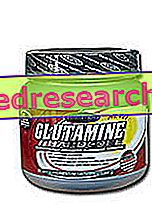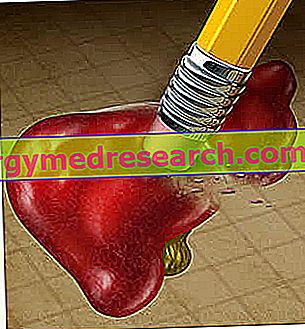
Information on GLUTAMINE HARDCORE - MUSCLETECH - Glutamine alpha-ketoglutarate
GLUTAMINE HARDCORE - MUSCLETECH
Food supplement based on L-Glutamine and L-Glutamine alpha-ketoglutarate
FORMAT
Pack of 300 grams
COMPOSITION
1-Glutamine / L -Glutamine alpha ketoglutrate
Portion (half scoop): L-Glutamine / L-Glutamine alpha-ketoglutarate: 2.5 grams
Product characteristics GLUTAMINE HARDCORE - MUSCLETECH - Glutamine alpha-ketoglutarate
L-Glutamine - is the most abundant amino acid present in our body, representing about 2/3 of the total amino acid pull. In physiological conditions, endogenous production, particularly active at muscular level, guarantees the satisfaction of its daily requirement; for this reason glutamine is included among the NON essential amino acids. However, there are some pathological conditions, such as severe burns, major traumas, chronic or infectious diseases, immunodeficiency disorders and diseases of the gastrointestinal tract, characterized by a greater expenditure of this amino acid, with the consequent increase in its metabolic demand. It is therefore clear that supplementation is particularly useful in these cases, even if the scientific world is still debating its usefulness, its dosage and the best form of administration, which at the moment seems to be parenteral.
Returning to the biological role of glutamine, it is important to remember some of its most important functions:
- Carrier of amino groups, to be used for protein synthesis or hepatic detoxification;
- Gluconeogenic precursor;
- Plastic and energy source for high mitotic index cells (enterocytes and cells of the immune system);
- Nervous precursor of glutamate, a powerful excitatory neurotransmitter;
- Energy source together with glucose and ketone bodies for neurons;
- Arginine and glutathione precursor.
L-Glutamine alpha-ketoglutarate : in this case glutamine is salified with a very important keto acid, which is precisely the alpha ketoglutarate. This represents an important crossroads between catabolic and anabolic reactions, being able to re-enter both the krebs cycle, supplying the energy cell, both in the gluconeogenesis processes and in the synthesis of amino acids such as glutamate, glutamine, proline and arginine. There are several scientific evidences that have shown how the integration with alpha ketoglutarate, can preserve the protein component in patients suffering from kidney disease, preserve the integrity of intestinal function, and play a protective role in numerous other chronic and severe diseases . In this supplement, the addition of alpha-ketoglutarate could be advantageous, not so much in preserving glutamine from the catabolic action in the eneterocyte, as in increasing the pull of muscle glutamine and plasma. In literature, in fact, there are some studies that report the efficacy of alpha-ketoglutarate supplementation in preserving the glutamine pull.
Glutamine in sports.
The role of glutamine in muscle and organic metabolism during physical activity is well known. A significant reduction in his muscular and plasma levels is accompanied by periods of intense training, representing a diagnostic index of overtraining. The sharp and prolonged decline in its levels inevitably has repercussions on the athlete's state of health, which is facing chronic fatigue, immune depression, infectious diseases and absorption deficits, with a consequent worsening of performance. The best way to sustain glutamine levels, however, does not seem to be related to supplementation with the finished product, much of which is consumed intestinal without supplying the muscle pull, but acting preventively. A correct diet, which includes carbohydrates with a medium glycemic index before training, and a post-work out meal with simple sugars and proteins seems to be able to sustain the glutamine levels, so that a protein surplus of 20/30 grams a day, yes has been shown to be effective in treating overtraining syndrome.
Rationalization of integration in sports GLUTAMINE HARDCORE - MUSCLETECH - Glutamine alpha-ketoglutarate
The data from the scientific world on the effectiveness of glutamine supplementation in sports seem to be somewhat contrasting. The long-awaited ergogenic results of athletes who use this supplement seem to be associated only with the simultaneous consumption of other products, mainly based on BCAAs and carbohydrates, while there seems to be some evidence about the important role of glutamine in the recovery phase, increasing glycogen resynthesis in conjunction with a carbohydrate-rich meal. More characterized, even if not shared by all groups of scientists, is the supporting role in supporting the immune defenses in athletes subjected to intense training, and exposed to overtraining.
Recommended use by company - GLUTAMINE HARDCORE - MUSCLETECH - Glutamine alpha-ketoglutarate
Half scoop (2.5 g) per day, with water or other liquid of your choice
Use in sports GLUTAMINE HARDCORE - MUSCLETECH - Glutamine alpha-ketoglutarate
Given the ongoing debate on the effectiveness of glutamine supplementation in sports, it is clear that it is difficult to formulate a reference dosage. Taking inspiration from the various studies, and not from the common practice that also uses doses higher than 20 grams / day, it is possible to observe that:
- at 100 mg / kg glutamine has been shown to be effective in reducing hyperammonaemia following intense physical exercise;
- at 3.5 g / day together with carbohydrates, it reduced the feeling of fatigue in soccer players;
- at 5 g / day, along with BCAAs and proteins, it significantly increased lean mass levels in 10 weeks;
- at 7 g / day he improved the immune profile in individuals subjected to intense training;
- at 8 g / day with carbohydrates it improved glycogen resynthesis.
Given these studies, the best and most characterized window of administration seems to be between 3 and 8 grams per day, subdividing them into different assumptions. In fact, both pre-workout and post-workout intake could be particularly useful.
The administration with water or energy drinks containing glucose and salt could be useful in facilitating the transport of glutamine, which is also accompanied by a movement of water.
How to optimize its activity - GLUTAMINE HARDCORE - MUSCLETECH - Glutamine alpha-ketoglutarate
From the various studies emerges as the association of
Glutamine + BCAA + Protein causes an increase in lean mass after weeks of integration and heavy exercise;
Glutamine + carbohydrates, taken in the post-work-out anabolic window, can facilitate glucose uptake and glycogen resynthesis; taken before intermittent training, they seem to improve athletic performance and reduce the feeling of fatigue.
Glutamine + creatine + ribose, does not seem to provide particular benefits in terms of body composition variation.
Side effects GLUTAMINE HARDCORE - MUSCLETECH - Glutamine alpha-ketoglutarate
Several studies have experimented supplementation with doses of oral glutamine even greater than 20 grams, without registering any particular side effect.
A single long-term study, with athletes taking doses of 28 grams per day for 2 weeks, distributed in 4 different assumptions, showed no side effects.
Precautions for use GLUTAMINE HARDCORE - MUSCLETECH - Glutamine alpha-ketoglutarate
The product is contraindicated in cases of renal or hepatic disease, cardiovascular disease and / or hypertension, during pregnancy, during lactation, under 12 years and in adolescents not yet trained.
In the event of prolonged use (over 6/8 weeks), medical advice is required.
This article, elaborated on the critical re-reading of scientific articles, university texts and common practice, is for informational purposes only and is therefore not a medical prescription. It is therefore always necessary to consult your doctor, nutritionist or pharmacist before starting to use any kind of supplement . Further information on the critical analysis of GLUTAMINE HARDCORE - MUSCLETECH - Glutamine alpha-ketoglutarate.
| BIBLIOGRAPHY |
J Pediatr Gastroenterol Nutr. 1998 May; 26 (5): 513-9. Efficacy of a glutamine-based oral rehydration solution on electrolyte and water absorption in a rabbit model of secretory diarrhea induced by cholera toxin.Silva AC, Santos-Neto MS, Soares AM, Fonteles MC, Guerrant RL, Lima AA. Effect of physical activity on glutamine metabolism. Agostini F, Biolo G. Curr Opin Clin Clin Metab Care. 2010 Jan; 13 (1): 58-64. Review. Br J Nutr. 2004 Oct; 92 (4): 627-34. Pernet P, Coudray-Lucas C, Schneid C, Jardel A, Cynober L. Kingsbury KJ, Kay L, Hjelm M. Contrasting plasma amino acid patterns in elite athletes: association with fatigue and infection. Br J Sports Med. 1998; 32: 25-33 Regul Toxicol Pharmacol. 2008 Apr; 50 (3): 376-99. Epub 2008 Jan 26. Risk assessment for the amino acids taurine, L-glutamine and L-arginine.Shao A, Hathcock JN. Clinical use of glutamine supplementation. Wernerman J. J Nutr. 2008 Oct; 138 (10): 2040S-2044S. Review. L-glutamine supplementation induces insulin resistance in adipose tissue and imprints insulin signing in the liver and muscle of rats with diet-induced obesity. Prada PO, Hirabara SM, de Souza CT, Schenka AA, Zecchin HG, Vassal J, Velloso LA, Carneiro E, Carvalheira JB, Curi R, Saad MJ. Diabetologia. 2007 Sep; 50 (9): 1949-59. Epub 2007 Jun 29. Effect of physical activity on glutamine metabolism. Agostini F, Biolo G. Curr Opin Clin Clin Metab Care. 2010 Jan; 13 (1): 58-64. Review. Peptide glutamine supplementation for soccer players. Favano A, Santos-Silva PR, Nakano EY, Pedrinelli A, Hernandez AJ, Greve JM. Clinics (Sao Paulo). 2008 Feb; 63 (1): 27-32. Glutamine supplementation prevents exercise-induced neutrophil apoptosis and reduces p38 MAPK and JNK phosphorylation and p53 and caspase 3 expression. Lagranha CJ, Hirabara SM, Curi R, Pithon-Curi TC. Cell Biochem Funct. 2007 Sep-Oct; 25 (5): 563-9. Impact of glutamine supplementation on glucose homeostasis during and after exercise. Iwashita S, Williams P, Jabbour K, Ueda T, Kobayashi H, Baier S, Flakoll PJ. J Appl Physiol. 2005 Nov; 99 (5): 1858-65. Epub 2005 Jul 21. Effects of effervescent creatine, ribose, and glutamine supplementation on muscular strength, muscular endurance, and body composition. Falk DJ, Heelan KA, Thyfault JP, Koch AJ. J Strength Cond Res. 2003 Nov; 17 (4): 810-6. Nutrition. 1997 Jul-Aug; 13 (7-8): 738-42. The effects of oral glutamine supplementation on athletes after prolonged, exhaustive exercise. Castell LM, Newsholme EA. Lack of functional benefit with glutamine versus placebo in Duchenne muscular dystrophy: a randomized crossover trial. Mok E, Letellier G, Cuisset JM, Denjean A, Gottrand F, Alberti C, Hankard R. PLoS One. 2009; 4 (5): e5448. Epub 2009 May 6 Glutamine protects against increases in blood ammonia in football players in an exercise intensity-dependent way. Bassini-Cameron A, Monteiro A, Gomes A, Werneck-de-Castro JP, Cameron L. Br J Sports Med. 2008 Apr; 42 (4): 260-6. Epub 2007 Nov 5. Effect of glutamine supplementation combined with resistance training in young adults. Candow DG, Chilibeck PD, Burke DG, Davison KS, Smith-Palmer T. Eur J Appl Physiol. 2001 Dec; 86 (2): 142-9. Cell Biochem Funct. 2010 Jan; 28 (1): 24-30. Cruzat VF, Rogero MM, Tirapegui J. L-glutamine supplementation induces insulin resistance in adipose tissue and imprints insulin signing in the liver and muscle of rats with diet-induced obesity. Prada PO, Hirabara SM, de Souza CT, Schenka AA, Zecchin HG, Vassal J, Velloso LA, Carneiro E, Carvalheira JB, Curi R, Saad MJ. Diabetologia. 2007 Sep; 50 (9): 1949-59. Epub 2007 Jun 29. Am J Physiol Cell Physiol. 2001 Oct; 281 (4): C1259-65. Effect of glutamine supplementation on exercise-induced changes in lymphocyte function.Krzywkowski K, Petersen EW, Ostrowski K, Kristensen JH, Boza J, Pedersen BK. Examination of the efficacy of acute L-alanyl-L-glutamine ingestion during hydration stress in endurance exercise. Hoffman JR, Ratamess NA, Kang J, Rashti SL, Kelly N, Gonzalez AM, Stec M, Anderson S, Bailey BL, Yamamoto LM, Hom LL, Kupchak BR, Faigenbaum AD, Maresh CM. J Int Soc Sports Nutr. 2010 Feb 3; 7: 8. J Strength Cond Res. 2006 Aug; 20 (3): 643-53. The effects of protein and amino acid supplementation on performance and trainingKerksick CM, Rasmussen CJ, Lancaster SL, Magu B, Smith P, Melton C, Greenwood M, Almada AL, Earnest CP, Kreider RB. Appl Physiol Nutr Metab. 2006 Oct; 31 (5): 518-29. Addition of glutamine to essential amino acids and carbohydratesWilkinson SB, Kim PL, Armstrong D, Phillips SM. |



